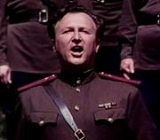
Evgeny Belyaev
Encyclopedia
Evgeny Mikhailovich Belyaev, also written as Yevgeny Belyayev (Russian
: Евгений Михайлович Беляев), (Klintsy, September 11, 1926 – February 21/22 1994) was a Russia
n tenor
soloist of the Alexandrov Ensemble under Boris Alexandrov. He is remembered in the Soviet Union
as the Russian Nightingale and in the West as one of the definitive singers of Kalinka.
in the Bryansk Oblast
.
As a child he was known by the diminutive, Zhenia (the soft "g" of Bryansk). As a schoolboy he won a singing competition at the Artek (camp)
(Young Pioneer camp
) near the Black Sea
.
During World War II
he served in the subdivision of zenith troops and gained the Army Olympiad Prize.
He fought in Czechoslovakia
and served as a Lance Corporal
in the first Red Orders of Suvorov and Kutuzov division of the Carpathian
Military District of the 4th Ukrainian Front
under the command of General-Colonel Andrei Yeremenko
. He is also said to have been in an anti-aircraft warfare
unit and to have finished the war as a sergeant
.
He is said to have sung in the lulls between the fighting. (NB: The Suvorov and Kutuzov division later became the 93rd Mechanized Brigade (Ukraine)
).
He then graduated from Gnessin State Musical College
. He married and had two sons, one of whom was a professional pianist.
1952: He became a Member of the Communist Party of the Soviet Union
(CPSU).
1955: He was a soloist of the Ensemble of Song and Dance of the Soviet Army of Alexandrov (Alexandrov Ensemble).
Under conductor Boris Alexandrov he recorded many songs, and performed all over the world: e.g. Europe, USA, Canada and Japan. The Ensemble performed music by Soviet composers, and Russian and Ukrainian folk songs. Kalinka always drew special applause
During his time as soloist with the Ensemble, Belyaev's singing teacher was Yevgeny Kanger, who only trained the leading soloists.
1958: Received the title: Honoured Artist of Russia (Meritorious Artist
).
1960: Received the title: People's Artist of Russia
.
1967: He was made People's Artist of the USSR
.
1960s-1970s: When the ensemble visited London
, Belyaev was described as the "Russian Nightingale" and "Mr Kalinka", and again "Monsieur Kalinka" in France
.
1978: He won the State Prize of the USSR.
1980: He appears to have been associated in some way with Roskontsert (or Roskontserta), the big-band variety orchestra headed by the Russian jazz musician Oleg Lundstrem
.
Also in this year he sang the voice-over part of the cartoon rabbit in the Russian film,Pif Paf Oi Oi Oi (Russian
: Пиф Паф Ой Ой Ой) (possibly Dir. Garri Bardin, 1980)
.
This animated cartoon
dramatizes via opera
a Russian
nursery rhyme
about a hunter shooting a rabbit ("Pif-paf!") which is brought home and found to be still alive ("Oi! Oi!"). Belyaev mainly performed in small chamber concerts in Russia after he left the Ensemble.
At some point he was made Honorary Citizen of Klintsy, his home town
.
1994: In the 1990s he sang with the government musical organization RosKontsert as an independent soloist. On February 21 or 22, 1994 he died. Belyaev attended Burdenko Military Hospital in Moscow with heart problems. He asked the doctors to let him go home for the weekend because there are usually no doctors during the weekend in hospitals, so they agreed. As soon as he arrived home on Kalininsky prospect in Moscow he died straight away of a heart attack. He was buried in Moscow, not far from his fellow soloist Alexei Sergeev, in a section of Novodevichy Cemetery
(Russian
: Новоде́вичье кла́дбище) affiliated branch located in Kuntsevo District
.
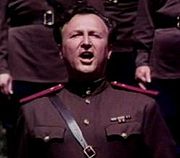 This commentary is about a music video featuring Evgeny Belyaev (see screenshot, right): Belyaev sings "Kalinka" on the music video "Soviet Army Chorus and Dance Ensemble". The first "Mr Kalinka" was Victor Nikitin who was the second tenor (Pyotr Tverdokhlebov was the first) to perform it with the dramatic, overarching and operatic notes which now precede the chorus in every Ensemble soloist's performance of this song. The origin of this kind of tenor
This commentary is about a music video featuring Evgeny Belyaev (see screenshot, right): Belyaev sings "Kalinka" on the music video "Soviet Army Chorus and Dance Ensemble". The first "Mr Kalinka" was Victor Nikitin who was the second tenor (Pyotr Tverdokhlebov was the first) to perform it with the dramatic, overarching and operatic notes which now precede the chorus in every Ensemble soloist's performance of this song. The origin of this kind of tenor
-bravado introduction to a song is in Arab music
, and can still be heard in Flamenco
cante jondo
. "Kalinka" is a trivial song about a snowball tree, but it lends itself perfectly to this kind of operatic showing-off. Belyaev himself was already the recipient of popular acclaim after the 1956 London
tour, and he had already been called "Mr Kalinka": the obvious natural successor to Nikitin. So in this performance, as the screenshot clearly shows, he is an immensely confident man with a great musical future before him. In fact it was very possibly the Cold War
which kept him tied to the Ensemble and away from the opera
tic career which he clearly deserved. Since Nikitin, "Kalinka" has always been one of the signature songs of the Ensemble, and the performances are always presented as both great achievement and great fun. This ca.1960 video is filmed outdoors, and shows the soldiers laughing, joshing each other, and dancing comically at the end. This is acting of course, and a striking contrast to the severe picture of Soviet life which was being presented at that time in the West. In the last moments of the "Kalinka" performance, Belyaev, like the other soldierly soloists not allowed to gesticulate while singing, cannot help himself and performs a brief Russian dance movement with his arms, showing us something we did not know before: that his background was in Russian dance culture as well as in music.
. Also his fame was subsumed within the fame of the Alexandrov Ensemble itself, when perhaps he would have gained greater personal fame had he pursued his natural course in the international opera circuit. However, it happens that he sang one of the definitive recorded versions of "Kalinka", and perhaps due to that, he is now becoming widely recognised and appreciated on websites such as YouTube. This is partly the result of "Kalinka" being recently associated with Chelsea Football Club.
bust of the singer
by the sculptor A.Smirnov
in the town
.
February 2008: A memorial concert was given in Bryansk in memory of Belyaev. It was attended by his great-niece Ekaterina Belaeva, fellow Communist Party members, people from his hometown Klintsy, and his old musical colleagues from the Alexandrov Ensemble. On this day the Klintsovskoy children's music school was named after Evgeny Belyaev.
genre, traditional songs, and other songs about Russia, besides a few foreign songs and operatic aria
s. For this he was considered a "national treasure".
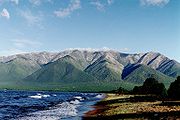
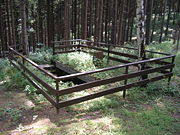
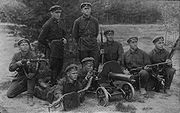 "Accidental Waltz": Probably a love song (lyrics unavailable).
"Accidental Waltz": Probably a love song (lyrics unavailable).
"And Again I Am in Line": Song of the veteran pilots of World War II, and their replacement by younger pilots
"Baikal Beauty" recalls beautiful Lake Baikal
and a girl at home for the homesick soldier.
"Before the Long Journey" remembers preparations for people's long journeys in the past; comparing them with the preparations of modern astronauts. Possibly sung as a tribute to Yuri Gagarin
and his fellow astronauts.
"Bryanski Partisan Song": A guerilla song about Soviet partisans
that mentions an ambush, burnt houses and revenge.
"By Mostochku Narrow": Possibly a veteran soldier's reminiscences (lyrics unavailable).
"Choir of Sailors from the Opera Dawn": (lyrics unavailable).
"Click the Guy": About soldiers, girls and Moscow
(lyrics unavailable).
"The Cruiser Aurora": "What do you dream of, cruiser Aurora, in the hour when the morning comes on the Neva
?" The Aurora is a symbol of the Communist Revolution
, and she has been a museum ship on the Neva at St. Petersburg since 1957.
"Donetski Night": refers to the horror of the Battle of Stalingrad
, and optimism about a woman (lyrics unavailable).
"Evening on the Road"/"Night on the Road": A sailors' song about going to sea.
"Far Far Away": About border guards far from home, protecting their homeland.
"Favourite Remember Us": Possibly about soldiers under orders, who know they will not come back (lyrics unavailable).
"Immortelle": Ballad about the death by the River Don
of a heroic Cossack soldier
, his body guarded by a single immortelle or everlasting Helichrysum flower, which according to the lyric does not bend with the wind.
"In a Sunny Forest Clearing": A soldier's love song.
"In the Dugouts
"': A soldier in his dugout (shelter)
in the snow, sings to his accordion about his girl far away, and feels warm at the thought before he dies.
"Kalinka": A frivolous song about a snowball tree.
"Nightingales" ("Solovii"): The lyric of "Nightingales" asks the nightingale to be quiet as the soldiers are sleeping. The song says that they need to sleep in preparation for the next battle, and there is an implication in the music that they may not come home. It is possible to interpret their next battle in relation to the afterlife, so the audience has the option to infer that they have died.
.
"Ogonek": Possibly about a girl and a soldier. It may refer to Ogonyok
, (Russian: Огонёк), which means "little flame", as a symbol of love (lyrics unavailable).
"Oh You Rye": A love song (lyrics unavailable).
"Cold Waves Lapping": (lyrics unavailable).
"'Ridna My Mother": (lyrics unavailable).
"Rodina": About the Russian landscape.
"Russian Field"': The Russian landscape as Fatherland.
"Shooting Kommunarov": A war story to give encouragement to fight.
"Sing Soldiers": A hearty song for military morale.
"Song of Russia": The Russian landscape and Vladimir Lenin
.
Two Maxim: a machine-gun
song (lyrics unavailable).
"Where Are You Now, Friends": About soldiers returning from World War II
.
musical arrangement (see Alexandrov Ensemble) which sets off his skill and creates the magic every time. A good example of this is the "Bryansky Partisan Song" with its Eastern Orthodox Church
music tonality and harmony, which has the effect of somehow making the Ensemble sound like a choir of thousands, evoking perhaps the size of the USSR, the history which created its peoples, and pride in the Soviet partisans
. Belyaev sings the secondary harmony in a duet with Alexei T. Sergeev and the choir here, but his enthusiastic voice adds a piquant excitement to the sheer power of the arrangement. So here is one possible answer to the question of why Belyaev stayed with the Ensemble instead of looking for easy fame on the opera circuit. Musically, it was worth staying.
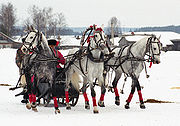
(b): from Amazon for current albums containing tracks by Belyaev.
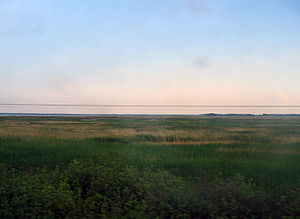
(a):
(b):
"Choir of Sailors from the Opera Dawn" (1954) (composer K. Molchanov; lyrics S. Severtsov): no data
"Cold Waves Lapping" (1954) (composer F. Bogoroditsky; lyrics Ya Repninsky): no data
"Kalinka" (1956; 1963; 1978; 1992).
(a):
(b):
"Annie Laurie" (1956; 1963).
(a):
(b):
"You Are Always Beautiful" (1956; 1963).
(a):
(b):
"Forever" (1956; 1963).
(a):
"Far Away" (1956) (composer G. Nosov; lyrics A. Churkin 1950).
(b):
"Troika" (1959) (Traditional).
(a):
.jpg)
"By Mostochku Narrow" (1960) (composer K. Akimov; lyrics M. Vershinin): no data
"Beautiful Moonlit Night" (or "Moonlight") (1960; 1963).
(a):
(b):
"Sing Soldiers", or "That Soldier Sings" (1960) (composer A. Doluhanyan; lyrics Nekrasova L. 1955)
(a):
"I Will Be a Soldier Again" (1960s?).
(a):
"Where Are Your Arms" (1948–65; 1985).
(a):
"My Country I Pledge To You" (1963?).
(a):
"Nightingales" (1963; 1975; 1978) (composer V.Solovev-Sedoy; lyrics A. Fatyanov)
(a):
(b):
"Near the Garden" (1963).
(a):
"Before the Long Journey" (1964) (composer Matvey Blanter; lyrics Vladimir Dyhovichny 1962)
(a):
"Song of Russia" (1964) (composer D. Kabalevsky; lyrics A. Newcomer)
(a):
"Come My Way" (ca.1965).
(a):
"Where This Country Was Built" (1965).
(a):
"On a Hill" (1968).
(a):
"Gorondorina La"' (1968).
(a):

(a):
"Song of the Klintsah" (Oct 1971) (composer A. Kulygin, lyrics A. Annual 1971) broadcast in the USSR on All-Union
Radio, to celebrate Belyaev's home town Klintsy
.
No recording known. He performed the song in concerts in the Bryansk
region in 1975
.
"'Wilderness" (1974).
(a):
The Russian Field (1975) (composer J. Frenkel; lyrics I. Goff 1965)
(a):
In My Moscow Suburb (ca.1975?).
(a):
In the Dugouts
(1975; 1977) (composer K. Sheets ; lyrics A. Surkov 1942): no data
Accidental Waltz (1977) (composer M.Fradkin; lyrics E.Dolmatovskaya): no data
Ogonek (1977) (lyrics M.Isakovsky): no data
My Favourite (1977) (composer M.Blanter; lyrics E.Dolmatovskaya 1942): no data
Two Maxim (1977) (composer S. Katz
lyrics M. Plyatskovsky 1941): no data
You Who Love (1978).
(a):
Catalina (1978).
(a):
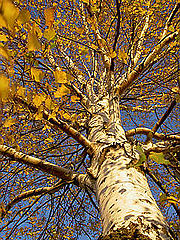
(a):
Evening on the Road/Night on the Road (undated) (composer V. Solovyov-Sedoy; lyrics A. Churkin 1943). Duet with Boris G. Shapenko)
Execution of the Warrior Revolution (1987)
(a):
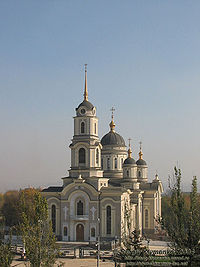
(a):
(b):
Black Eyebrows (1992).
(a):
(b):
Happy Girl (1992).
(a):
(b):
Birch Tree Stood in the Meadow (1992).
(a):
(b):
In the Forest (1992).
(a):
(b):
Wait For Your Soldier/Wait a Day to Return (1992).
(a):
(b):
Motherland/Country (1992).
(a):
(b):
(a): no data
Take a Bandura (undated).
(a):
Our Friends (undated).
(a):
Hey Girl (undated).
(a):
Rough sea spray (cruiser "VARYAGU") (undated).
(a):
The Cruiser Aurora (undated) (music: V.Shainskiy; lyrics: M.Matusovskiy)
Soldier's Wife (undated).
(a):
Epitaph (undated).
(a):
In the Central Steppes (undated).
(b):
Baikal Beauty (undated) (composer A. Doluhanyan; lyrics M. Lisyansky): no data
Immortelle (undated) (composer S. Zaslavsky ; lyrics A. Sofronov): no data
Donetski Night (undated) (composer E. Zharkovsky; lyrics N.Upenik, L.Titova 1975): no data
Where Are You Now, Friends (undated) (composer V. Solovyov-Sedoy; lyrics A. Fatyanov 1947): no data
And Again I am In Line (undated) (composer B. Muradeli ; lyrics S. Bencken 1960): no data
Favourite, Remember Us (undated) (composer Boris Alexandrov ; lyrics N. Dobronravov 1978): no data
In a Sunny Forest Clearing (undated) (composer V.P.Solovev-Sedoy; lyrics A. Fatyanov 1970): no data
Bryansky Partisan Song (undated) (composer D. Kabalevsky; lyrics V.Lebedev-Kumach). Duet with Alexei T. Sergeev: no data
.
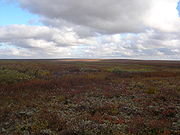 Shooting Kommunarov (undated) (composer V.Tan-Bogoraz): no data
Shooting Kommunarov (undated) (composer V.Tan-Bogoraz): no data
Rodina (undated) (composer A. Samoylov; lyrics F. Savinov): no data
Click the Guy (undated) (composer LA Shats; lyrics V. Alferov 1977): no data
At the Gate, The Gate (undated) (traditional): no data
I Left the Army (undated) (composer S. Tulika; lyrics V. Malkov): no data
I Loved You (undated) (composer B.Sheremetyev; lyrics Pushkin): no data
I Met You (undated) (composer B.Sheremetyev; lyrics F.Tyutchev): no data
It Evokes Memories (undated) (composer P.Bulakhov): no data
I Took You into the Tundra (undated) (composer M. Fradkin; lyrics M. Plyatskovsky): no data
.
Listen If You Want (undated) (composer N.Shiskin): no data
My Moscow (undated) (composer O. Feltsman; lyrics A. Sofronov): no data
Separation (undated) (composer A.Gurilev; lyrics A.Koltsov): no data
Soldiers' Mothers (undated) (composer Boris Alexandrov; lyrics S. Bencken): no data
Soldiers Pribautki (undated) (composer A. Doluhanyan; lyrics G. Hodos). Duet with B. Ruslanov: no data
Unselfish Soul (undated) (composer A. Pakhmutova; lyrics M. Lisyansky): no data
We Went Out Into the Garden (undated) (composer M.Tolstoy; lyrics A.Butt): no data
The Book Motherland (undated) (composer Boris Alexandrov ; lyrics N. Dorizo): no data
Kid (undated) (Spanish): no data
To You I Swear the Fatherland (undated): no data

page.
Russian language
Russian is a Slavic language used primarily in Russia, Belarus, Uzbekistan, Kazakhstan, Tajikistan and Kyrgyzstan. It is an unofficial but widely spoken language in Ukraine, Moldova, Latvia, Turkmenistan and Estonia and, to a lesser extent, the other countries that were once constituent republics...
: Евгений Михайлович Беляев), (Klintsy, September 11, 1926 – February 21/22 1994) was a Russia
Russia
Russia or , officially known as both Russia and the Russian Federation , is a country in northern Eurasia. It is a federal semi-presidential republic, comprising 83 federal subjects...
n tenor
Tenor
The tenor is a type of male singing voice and is the highest male voice within the modal register. The typical tenor voice lies between C3, the C one octave below middle C, to the A above middle C in choral music, and up to high C in solo work. The low extreme for tenors is roughly B2...
soloist of the Alexandrov Ensemble under Boris Alexandrov. He is remembered in the Soviet Union
Soviet Union
The Soviet Union , officially the Union of Soviet Socialist Republics , was a constitutionally socialist state that existed in Eurasia between 1922 and 1991....
as the Russian Nightingale and in the West as one of the definitive singers of Kalinka.
Early years and private life
1926: On September 11, he was born in KlintsyKlintsy
Klintsy is a town in Bryansk Oblast, Russia, situated on the Turosna River southwest of Bryansk. Population: 60,000 .A famous native of this town is Evgeny Belyaev of the Alexandrov Ensemble. The Klintsovskoy children's music school is named after EM Belyaeva , and a bust of Belyaev has been...
in the Bryansk Oblast
Bryansk Oblast
Bryansk Oblast is a federal subject of Russia . Its administrative center is the city of Bryansk. Population: 1,278,087 .-History:...
.
As a child he was known by the diminutive, Zhenia (the soft "g" of Bryansk). As a schoolboy he won a singing competition at the Artek (camp)
Artek (camp)
Artek is a Young Pioneer camp near Gurzuf, Ukraine. It was established on June 16 1925 on the Black Sea in the town of Gurzuf located on the Crimean peninsula, near Medved Mountain, Ukraine. The camp first hosted only 80 children but then grew rapidly. In 1969 it had an area of 3.2 km²...
(Young Pioneer camp
Young Pioneer camp
Young Pioneer camp was the name for the vacation or summer camp of Young Pioneers. In the 20th century these camps existed in many socialist countries, particularly in the Soviet Union....
) near the Black Sea
Black Sea
The Black Sea is bounded by Europe, Anatolia and the Caucasus and is ultimately connected to the Atlantic Ocean via the Mediterranean and the Aegean seas and various straits. The Bosphorus strait connects it to the Sea of Marmara, and the strait of the Dardanelles connects that sea to the Aegean...
.
During World War II
World War II
World War II, or the Second World War , was a global conflict lasting from 1939 to 1945, involving most of the world's nations—including all of the great powers—eventually forming two opposing military alliances: the Allies and the Axis...
he served in the subdivision of zenith troops and gained the Army Olympiad Prize.
He fought in Czechoslovakia
Czechoslovakia
Czechoslovakia or Czecho-Slovakia was a sovereign state in Central Europe which existed from October 1918, when it declared its independence from the Austro-Hungarian Empire, until 1992...
and served as a Lance Corporal
Lance Corporal
Lance corporal is a military rank, used by many armed forces worldwide, and also by some police forces and other uniformed organizations. It is below the rank of corporal, and is typically the lowest non-commissioned officer, usually equivalent to the NATO Rank Grade OR-3.- Etymology :The presumed...
in the first Red Orders of Suvorov and Kutuzov division of the Carpathian
Carpathian
Carpathian may refer to:*Carpathian Mountains of Central and Eastern Europe*Carpathian Convention on sustainable development in that region*Carpathian Shepherd Dog, a Romanian sheep dog*Subcarpathian Voivodeship, an administrative division of Poland...
Military District of the 4th Ukrainian Front
4th Ukrainian Front
The 4th Ukrainian Front was a front of the Red Army during World War II...
under the command of General-Colonel Andrei Yeremenko
Andrei Yeremenko
Andrey Ivanovich Yeryomenko or Yeremenko or Eremenko was a Soviet general during World War II, Marshal of the Soviet Union.-Draft and early service:...
. He is also said to have been in an anti-aircraft warfare
Anti-aircraft warfare
NATO defines air defence as "all measures designed to nullify or reduce the effectiveness of hostile air action." They include ground and air based weapon systems, associated sensor systems, command and control arrangements and passive measures. It may be to protect naval, ground and air forces...
unit and to have finished the war as a sergeant
Sergeant
Sergeant is a rank used in some form by most militaries, police forces, and other uniformed organizations around the world. Its origins are the Latin serviens, "one who serves", through the French term Sergent....
.
He is said to have sung in the lulls between the fighting. (NB: The Suvorov and Kutuzov division later became the 93rd Mechanized Brigade (Ukraine)
93rd Mechanized Brigade (Ukraine)
The 93rd Guards Mechanized Brigade is a formation of the Ukrainian Ground Forces. The full name of the Brigade is the 93rd Separate Guards Mechanized Kharkiv twice Order of the Red Banner, Suvorov's and Kutuzov's awards Brigade....
).
He then graduated from Gnessin State Musical College
Gnessin State Musical College
The Gnessin State Musical College and Gnessin Russian Academy of Music is a prominent music school in Moscow, Russia...
. He married and had two sons, one of whom was a professional pianist.
Musical career
1947: He was a soloist of the Ensemble of Song and Dance of the Carpathian military district.1952: He became a Member of the Communist Party of the Soviet Union
Communist Party of the Soviet Union
The Communist Party of the Soviet Union was the only legal, ruling political party in the Soviet Union and one of the largest communist organizations in the world...
(CPSU).
1955: He was a soloist of the Ensemble of Song and Dance of the Soviet Army of Alexandrov (Alexandrov Ensemble).
Under conductor Boris Alexandrov he recorded many songs, and performed all over the world: e.g. Europe, USA, Canada and Japan. The Ensemble performed music by Soviet composers, and Russian and Ukrainian folk songs. Kalinka always drew special applause
During his time as soloist with the Ensemble, Belyaev's singing teacher was Yevgeny Kanger, who only trained the leading soloists.
1958: Received the title: Honoured Artist of Russia (Meritorious Artist
Meritorious Artist
Meritorious Artist , also translated as Merited Artist, Deserved Artist or Distinguished Artist or Honorary Artist or Honorable Actor) is an honorary title in the Soviet Union, Russian Federation, Union republics, and Autonomous republics, also in some other Eastern bloc states, as well as in a...
).
1960: Received the title: People's Artist of Russia
People's Artist of Russia
People's Artist of Russia, also sometimes translated as National Artist of Russia, is an honorary title granted to citizens of Russia.It succeeded both the all-Soviet union award People's Artist of the USSR , and more directly the local republic award, People's Artist of the RSFSR , after the...
.
1967: He was made People's Artist of the USSR
People's Artist of the USSR
People's Artist of the USSR, also sometimes translated as National Artist of the USSR, was an honorary title granted to citizens of the Soviet Union.- Nomenclature and significance :...
.
1960s-1970s: When the ensemble visited London
London
London is the capital city of :England and the :United Kingdom, the largest metropolitan area in the United Kingdom, and the largest urban zone in the European Union by most measures. Located on the River Thames, London has been a major settlement for two millennia, its history going back to its...
, Belyaev was described as the "Russian Nightingale" and "Mr Kalinka", and again "Monsieur Kalinka" in France
France
The French Republic , The French Republic , The French Republic , (commonly known as France , is a unitary semi-presidential republic in Western Europe with several overseas territories and islands located on other continents and in the Indian, Pacific, and Atlantic oceans. Metropolitan France...
.
1978: He won the State Prize of the USSR.
1980: He appears to have been associated in some way with Roskontsert (or Roskontserta), the big-band variety orchestra headed by the Russian jazz musician Oleg Lundstrem
Oleg Lundstrem
Oleg Leonidovich Lundstrem was a Soviet and Russian jazz composer and conductor of the Oleg Lundstrem Orchestra, one of the earliest officially recognized jazz bands in the Soviet Union Oleg Leonidovich Lundstrem (also spelled Lundstroem, Lundström, ; April 2, 1916, Chita—October 14, 2005, near...
.
Also in this year he sang the voice-over part of the cartoon rabbit in the Russian film,Pif Paf Oi Oi Oi (Russian
Russian language
Russian is a Slavic language used primarily in Russia, Belarus, Uzbekistan, Kazakhstan, Tajikistan and Kyrgyzstan. It is an unofficial but widely spoken language in Ukraine, Moldova, Latvia, Turkmenistan and Estonia and, to a lesser extent, the other countries that were once constituent republics...
: Пиф Паф Ой Ой Ой) (possibly Dir. Garri Bardin, 1980)
.
This animated cartoon
Animated cartoon
An animated cartoon is a short, hand-drawn film for the cinema, television or computer screen, featuring some kind of story or plot...
dramatizes via opera
Opera
Opera is an art form in which singers and musicians perform a dramatic work combining text and musical score, usually in a theatrical setting. Opera incorporates many of the elements of spoken theatre, such as acting, scenery, and costumes and sometimes includes dance...
a Russian
Russian language
Russian is a Slavic language used primarily in Russia, Belarus, Uzbekistan, Kazakhstan, Tajikistan and Kyrgyzstan. It is an unofficial but widely spoken language in Ukraine, Moldova, Latvia, Turkmenistan and Estonia and, to a lesser extent, the other countries that were once constituent republics...
nursery rhyme
Nursery rhyme
The term nursery rhyme is used for "traditional" poems for young children in Britain and many other countries, but usage only dates from the 19th century and in North America the older ‘Mother Goose Rhymes’ is still often used.-Lullabies:...
about a hunter shooting a rabbit ("Pif-paf!") which is brought home and found to be still alive ("Oi! Oi!"). Belyaev mainly performed in small chamber concerts in Russia after he left the Ensemble.
At some point he was made Honorary Citizen of Klintsy, his home town
.
1994: In the 1990s he sang with the government musical organization RosKontsert as an independent soloist. On February 21 or 22, 1994 he died. Belyaev attended Burdenko Military Hospital in Moscow with heart problems. He asked the doctors to let him go home for the weekend because there are usually no doctors during the weekend in hospitals, so they agreed. As soon as he arrived home on Kalininsky prospect in Moscow he died straight away of a heart attack. He was buried in Moscow, not far from his fellow soloist Alexei Sergeev, in a section of Novodevichy Cemetery
Novodevichy Cemetery
Novodevichy Cemetery is the most famous cemetery in Moscow, Russia. It is next to the 16th-century Novodevichy Convent, which is the city's third most popular tourist site. It should not be confused with the Novodevichy Cemetery in Saint Petersburg....
(Russian
Russian language
Russian is a Slavic language used primarily in Russia, Belarus, Uzbekistan, Kazakhstan, Tajikistan and Kyrgyzstan. It is an unofficial but widely spoken language in Ukraine, Moldova, Latvia, Turkmenistan and Estonia and, to a lesser extent, the other countries that were once constituent republics...
: Новоде́вичье кла́дбище) affiliated branch located in Kuntsevo District
Kuntsevo District
Kuntsevo is a district of Western Administrative Okrug of Moscow, Russia. Population: -History:In the 18th century, a palace and a park were built; they were often visited by the Empress Catherine II. Kuntsevo is the site of the Church of Theotokos Orans. In the 19th century, Kuntsevo became a...
.
Critical commentary

Tenor
The tenor is a type of male singing voice and is the highest male voice within the modal register. The typical tenor voice lies between C3, the C one octave below middle C, to the A above middle C in choral music, and up to high C in solo work. The low extreme for tenors is roughly B2...
-bravado introduction to a song is in Arab music
Arab music
Arabic music or Arab music is the music of the Arab World, including several genres and styles of music ranging from Arabic classical to Arabic pop music and from secular to sacred music....
, and can still be heard in Flamenco
Flamenco
Flamenco is a genre of music and dance which has its foundation in Andalusian music and dance and in whose evolution Andalusian Gypsies played an important part....
cante jondo
Cante jondo
Cante jondo is a vocal style in flamenco. An unspoiled form of Andalusian folk music, the name means deep song It is generally considered that the common traditional classification of flamenco music is divided into three groups of which the deepest, most serious forms are known as cante jondo...
. "Kalinka" is a trivial song about a snowball tree, but it lends itself perfectly to this kind of operatic showing-off. Belyaev himself was already the recipient of popular acclaim after the 1956 London
London
London is the capital city of :England and the :United Kingdom, the largest metropolitan area in the United Kingdom, and the largest urban zone in the European Union by most measures. Located on the River Thames, London has been a major settlement for two millennia, its history going back to its...
tour, and he had already been called "Mr Kalinka": the obvious natural successor to Nikitin. So in this performance, as the screenshot clearly shows, he is an immensely confident man with a great musical future before him. In fact it was very possibly the Cold War
Cold War
The Cold War was the continuing state from roughly 1946 to 1991 of political conflict, military tension, proxy wars, and economic competition between the Communist World—primarily the Soviet Union and its satellite states and allies—and the powers of the Western world, primarily the United States...
which kept him tied to the Ensemble and away from the opera
Opera
Opera is an art form in which singers and musicians perform a dramatic work combining text and musical score, usually in a theatrical setting. Opera incorporates many of the elements of spoken theatre, such as acting, scenery, and costumes and sometimes includes dance...
tic career which he clearly deserved. Since Nikitin, "Kalinka" has always been one of the signature songs of the Ensemble, and the performances are always presented as both great achievement and great fun. This ca.1960 video is filmed outdoors, and shows the soldiers laughing, joshing each other, and dancing comically at the end. This is acting of course, and a striking contrast to the severe picture of Soviet life which was being presented at that time in the West. In the last moments of the "Kalinka" performance, Belyaev, like the other soldierly soloists not allowed to gesticulate while singing, cannot help himself and performs a brief Russian dance movement with his arms, showing us something we did not know before: that his background was in Russian dance culture as well as in music.
Worldwide fame
This superb lyric tenor did not get the worldwide acclaim that he deserved during his lifetime; possibly because his prime occurred in the middle of the Cold WarCold War
The Cold War was the continuing state from roughly 1946 to 1991 of political conflict, military tension, proxy wars, and economic competition between the Communist World—primarily the Soviet Union and its satellite states and allies—and the powers of the Western world, primarily the United States...
. Also his fame was subsumed within the fame of the Alexandrov Ensemble itself, when perhaps he would have gained greater personal fame had he pursued his natural course in the international opera circuit. However, it happens that he sang one of the definitive recorded versions of "Kalinka", and perhaps due to that, he is now becoming widely recognised and appreciated on websites such as YouTube. This is partly the result of "Kalinka" being recently associated with Chelsea Football Club.
Russian fame
April 2007: In celebration of the 300th anniversary of the founding of Klintsy, Belyaev's home town, it was decided to install abust of the singer
by the sculptor A.Smirnov
in the town
.
February 2008: A memorial concert was given in Bryansk in memory of Belyaev. It was attended by his great-niece Ekaterina Belaeva, fellow Communist Party members, people from his hometown Klintsy, and his old musical colleagues from the Alexandrov Ensemble. On this day the Klintsovskoy children's music school was named after Evgeny Belyaev.
Repertoire
His work as soloist with the Alexandrov Ensemble meant that he sang primarily songs in the Russian folk musicFolk music
Folk music is an English term encompassing both traditional folk music and contemporary folk music. The term originated in the 19th century. Traditional folk music has been defined in several ways: as music transmitted by mouth, as music of the lower classes, and as music with unknown composers....
genre, traditional songs, and other songs about Russia, besides a few foreign songs and operatic aria
Aria
An aria in music was originally any expressive melody, usually, but not always, performed by a singer. The term is now used almost exclusively to describe a self-contained piece for one voice usually with orchestral accompaniment...
s. For this he was considered a "national treasure".
What the songs are about
In alphabetical order of translated titles, with links to auto-translated lyrics:


"And Again I Am in Line": Song of the veteran pilots of World War II, and their replacement by younger pilots
"Baikal Beauty" recalls beautiful Lake Baikal
Lake Baikal
Lake Baikal is the world's oldest at 30 million years old and deepest lake with an average depth of 744.4 metres.Located in the south of the Russian region of Siberia, between Irkutsk Oblast to the northwest and the Buryat Republic to the southeast, it is the most voluminous freshwater lake in the...
and a girl at home for the homesick soldier.
"Before the Long Journey" remembers preparations for people's long journeys in the past; comparing them with the preparations of modern astronauts. Possibly sung as a tribute to Yuri Gagarin
Yuri Gagarin
Yuri Alekseyevich Gagarin was a Soviet pilot and cosmonaut. He was the first human to journey into outer space, when his Vostok spacecraft completed an orbit of the Earth on April 12, 1961....
and his fellow astronauts.
"Bryanski Partisan Song": A guerilla song about Soviet partisans
Soviet partisans
The Soviet partisans were members of a resistance movement which fought a guerrilla war against the Axis occupation of the Soviet Union during World War II....
that mentions an ambush, burnt houses and revenge.
"By Mostochku Narrow": Possibly a veteran soldier's reminiscences (lyrics unavailable).
"Choir of Sailors from the Opera Dawn": (lyrics unavailable).
"Click the Guy": About soldiers, girls and Moscow
Moscow
Moscow is the capital, the most populous city, and the most populous federal subject of Russia. The city is a major political, economic, cultural, scientific, religious, financial, educational, and transportation centre of Russia and the continent...
(lyrics unavailable).
"The Cruiser Aurora": "What do you dream of, cruiser Aurora, in the hour when the morning comes on the Neva
Neva River
The Neva is a river in northwestern Russia flowing from Lake Ladoga through the western part of Leningrad Oblast to the Neva Bay of the Gulf of Finland. Despite its modest length , it is the third largest river in Europe in terms of average discharge .The Neva is the only river flowing from Lake...
?" The Aurora is a symbol of the Communist Revolution
October Revolution
The October Revolution , also known as the Great October Socialist Revolution , Red October, the October Uprising or the Bolshevik Revolution, was a political revolution and a part of the Russian Revolution of 1917...
, and she has been a museum ship on the Neva at St. Petersburg since 1957.
"Donetski Night": refers to the horror of the Battle of Stalingrad
Battle of Stalingrad
The Battle of Stalingrad was a major battle of World War II in which Nazi Germany and its allies fought the Soviet Union for control of the city of Stalingrad in southwestern Russia. The battle took place between 23 August 1942 and 2 February 1943...
, and optimism about a woman (lyrics unavailable).
"Evening on the Road"/"Night on the Road": A sailors' song about going to sea.
"Far Far Away": About border guards far from home, protecting their homeland.
"Favourite Remember Us": Possibly about soldiers under orders, who know they will not come back (lyrics unavailable).
"Immortelle": Ballad about the death by the River Don
Don River (Russia)
The Don River is one of the major rivers of Russia. It rises in the town of Novomoskovsk 60 kilometres southeast from Tula, southeast of Moscow, and flows for a distance of about 1,950 kilometres to the Sea of Azov....
of a heroic Cossack soldier
Cossack host
A Cossack host or Cossack viysko was an administrative subdivision of Cossacks in Imperial Russia...
, his body guarded by a single immortelle or everlasting Helichrysum flower, which according to the lyric does not bend with the wind.
"In a Sunny Forest Clearing": A soldier's love song.
"In the Dugouts
Zemlyanka (song)
Zemlyanka was the name for a German-Soviet War song written by Alexey Surkov and Konstantin Listov in 1941 during the Battle of Moscow...
"': A soldier in his dugout (shelter)
Dugout (shelter)
A dugout or dug-out, also known as a pithouse, pit-house, earth lodge, mud hut, is a shelter for humans or domesticated animals and livestock based on a hole or depression dug into the ground. These structures are one of the most ancient types of human housing known to archeologists...
in the snow, sings to his accordion about his girl far away, and feels warm at the thought before he dies.
"Kalinka": A frivolous song about a snowball tree.
"Nightingales" ("Solovii"): The lyric of "Nightingales" asks the nightingale to be quiet as the soldiers are sleeping. The song says that they need to sleep in preparation for the next battle, and there is an implication in the music that they may not come home. It is possible to interpret their next battle in relation to the afterlife, so the audience has the option to infer that they have died.
.
"Ogonek": Possibly about a girl and a soldier. It may refer to Ogonyok
Ogonyok
Ogoniok is one of the oldest weekly illustrated magazines in Russia, issued since . It was re-established in the Soviet Union in 1923 by Mikhail Koltsov....
, (Russian: Огонёк), which means "little flame", as a symbol of love (lyrics unavailable).
"Oh You Rye": A love song (lyrics unavailable).
"Cold Waves Lapping": (lyrics unavailable).
"'Ridna My Mother": (lyrics unavailable).
"Rodina": About the Russian landscape.
"Russian Field"': The Russian landscape as Fatherland.
"Shooting Kommunarov": A war story to give encouragement to fight.
"Sing Soldiers": A hearty song for military morale.
"Song of Russia": The Russian landscape and Vladimir Lenin
Vladimir Lenin
Vladimir Ilyich Lenin was a Russian Marxist revolutionary and communist politician who led the October Revolution of 1917. As leader of the Bolsheviks, he headed the Soviet state during its initial years , as it fought to establish control of Russia in the Russian Civil War and worked to create a...
.
Two Maxim: a machine-gun
Maxim gun
The Maxim gun was the first self-powered machine gun, invented by the American-born British inventor Sir Hiram Maxim in 1884. It has been called "the weapon most associated with [British] imperial conquest".-Functionality:...
song (lyrics unavailable).
"Where Are You Now, Friends": About soldiers returning from World War II
World War II
World War II, or the Second World War , was a global conflict lasting from 1939 to 1945, involving most of the world's nations—including all of the great powers—eventually forming two opposing military alliances: the Allies and the Axis...
.
Song arrangements
Belyaev was a great lyric tenor, but it's Boris Alexandrov'smusical arrangement (see Alexandrov Ensemble) which sets off his skill and creates the magic every time. A good example of this is the "Bryansky Partisan Song" with its Eastern Orthodox Church
Eastern Orthodox Church
The Orthodox Church, officially called the Orthodox Catholic Church and commonly referred to as the Eastern Orthodox Church, is the second largest Christian denomination in the world, with an estimated 300 million adherents mainly in the countries of Belarus, Bulgaria, Cyprus, Georgia, Greece,...
music tonality and harmony, which has the effect of somehow making the Ensemble sound like a choir of thousands, evoking perhaps the size of the USSR, the history which created its peoples, and pride in the Soviet partisans
Soviet partisans
The Soviet partisans were members of a resistance movement which fought a guerrilla war against the Axis occupation of the Soviet Union during World War II....
. Belyaev sings the secondary harmony in a duet with Alexei T. Sergeev and the choir here, but his enthusiastic voice adds a piquant excitement to the sheer power of the arrangement. So here is one possible answer to the question of why Belyaev stayed with the Ensemble instead of looking for easy fame on the opera circuit. Musically, it was worth staying.
Recorded songs
In date order of original recording dates (not album production dates). Some original recordings have been recycled over many albums, and this is still happening - especially with some earlier recordings - due to their continuing popularity.
Key to links
(a): from Japanese "Red Army" webpage, for images of past album sleeves containing tracks by Belyaev.(b): from Amazon for current albums containing tracks by Belyaev.

1950s
"Oh You Rye" (1950; 1964; 1978; 1992) (composer A. Doluhanyan; lyrics A. Newcomer 1950)(a):
(b):
"Choir of Sailors from the Opera Dawn" (1954) (composer K. Molchanov; lyrics S. Severtsov): no data
"Cold Waves Lapping" (1954) (composer F. Bogoroditsky; lyrics Ya Repninsky): no data
"Kalinka" (1956; 1963; 1978; 1992).
(a):
(b):
"Annie Laurie" (1956; 1963).
(a):
(b):
"You Are Always Beautiful" (1956; 1963).
(a):
(b):
"Forever" (1956; 1963).
(a):
"Far Away" (1956) (composer G. Nosov; lyrics A. Churkin 1950).
(b):
"Troika" (1959) (Traditional).
(a):
.jpg)
1960s
"Ridna My Mother" (1960) (composer P. Maiboroda; lyrics A. Malyshko): no data"By Mostochku Narrow" (1960) (composer K. Akimov; lyrics M. Vershinin): no data
"Beautiful Moonlit Night" (or "Moonlight") (1960; 1963).
(a):
(b):
"Sing Soldiers", or "That Soldier Sings" (1960) (composer A. Doluhanyan; lyrics Nekrasova L. 1955)
(a):
"I Will Be a Soldier Again" (1960s?).
(a):
"Where Are Your Arms" (1948–65; 1985).
(a):
"My Country I Pledge To You" (1963?).
(a):
"Nightingales" (1963; 1975; 1978) (composer V.Solovev-Sedoy; lyrics A. Fatyanov)
(a):
(b):
"Near the Garden" (1963).
(a):
"Before the Long Journey" (1964) (composer Matvey Blanter; lyrics Vladimir Dyhovichny 1962)
(a):
"Song of Russia" (1964) (composer D. Kabalevsky; lyrics A. Newcomer)
(a):
"Come My Way" (ca.1965).
(a):
"Where This Country Was Built" (1965).
(a):
"On a Hill" (1968).
(a):
"Gorondorina La"' (1968).
(a):

1970s
"Russia" (ca.1970).(a):
"Song of the Klintsah" (Oct 1971) (composer A. Kulygin, lyrics A. Annual 1971) broadcast in the USSR on All-Union
Soviet Union
The Soviet Union , officially the Union of Soviet Socialist Republics , was a constitutionally socialist state that existed in Eurasia between 1922 and 1991....
Radio, to celebrate Belyaev's home town Klintsy
Klintsy
Klintsy is a town in Bryansk Oblast, Russia, situated on the Turosna River southwest of Bryansk. Population: 60,000 .A famous native of this town is Evgeny Belyaev of the Alexandrov Ensemble. The Klintsovskoy children's music school is named after EM Belyaeva , and a bust of Belyaev has been...
.
No recording known. He performed the song in concerts in the Bryansk
Bryansk
Bryansk is a city and the administrative center of Bryansk Oblast, Russia, located southwest of Moscow. Population: -History:The first written mention of Bryansk was in 1146, in the Hypatian Codex, as Debryansk...
region in 1975
.
"'Wilderness" (1974).
(a):
The Russian Field (1975) (composer J. Frenkel; lyrics I. Goff 1965)
(a):
In My Moscow Suburb (ca.1975?).
(a):
In the Dugouts
Zemlyanka (song)
Zemlyanka was the name for a German-Soviet War song written by Alexey Surkov and Konstantin Listov in 1941 during the Battle of Moscow...
(1975; 1977) (composer K. Sheets ; lyrics A. Surkov 1942): no data
Accidental Waltz (1977) (composer M.Fradkin; lyrics E.Dolmatovskaya): no data
Ogonek (1977) (lyrics M.Isakovsky): no data
My Favourite (1977) (composer M.Blanter; lyrics E.Dolmatovskaya 1942): no data
Two Maxim (1977) (composer S. Katz
lyrics M. Plyatskovsky 1941): no data
You Who Love (1978).
(a):
Catalina (1978).
(a):

1980s
Evening on the Waterfront (1985).(a):
Evening on the Road/Night on the Road (undated) (composer V. Solovyov-Sedoy; lyrics A. Churkin 1943). Duet with Boris G. Shapenko)
Execution of the Warrior Revolution (1987)
(a):

1990s
In the Sunny Meadow/Shine in the Field (1992).(a):
(b):
Black Eyebrows (1992).
(a):
(b):
Happy Girl (1992).
(a):
(b):
Birch Tree Stood in the Meadow (1992).
(a):
(b):
In the Forest (1992).
(a):
(b):
Wait For Your Soldier/Wait a Day to Return (1992).
(a):
(b):
Motherland/Country (1992).
(a):
(b):
Undated
Lying (undated).(a): no data
Take a Bandura (undated).
(a):
Our Friends (undated).
(a):
Hey Girl (undated).
(a):
Rough sea spray (cruiser "VARYAGU") (undated).
(a):
The Cruiser Aurora (undated) (music: V.Shainskiy; lyrics: M.Matusovskiy)
Soldier's Wife (undated).
(a):
Epitaph (undated).
(a):
In the Central Steppes (undated).
(b):
Baikal Beauty (undated) (composer A. Doluhanyan; lyrics M. Lisyansky): no data
Immortelle (undated) (composer S. Zaslavsky ; lyrics A. Sofronov): no data
Donetski Night (undated) (composer E. Zharkovsky; lyrics N.Upenik, L.Titova 1975): no data
Where Are You Now, Friends (undated) (composer V. Solovyov-Sedoy; lyrics A. Fatyanov 1947): no data
And Again I am In Line (undated) (composer B. Muradeli ; lyrics S. Bencken 1960): no data
Favourite, Remember Us (undated) (composer Boris Alexandrov ; lyrics N. Dobronravov 1978): no data
In a Sunny Forest Clearing (undated) (composer V.P.Solovev-Sedoy; lyrics A. Fatyanov 1970): no data
Bryansky Partisan Song (undated) (composer D. Kabalevsky; lyrics V.Lebedev-Kumach). Duet with Alexei T. Sergeev: no data
.

Rodina (undated) (composer A. Samoylov; lyrics F. Savinov): no data
Click the Guy (undated) (composer LA Shats; lyrics V. Alferov 1977): no data
At the Gate, The Gate (undated) (traditional): no data
I Left the Army (undated) (composer S. Tulika; lyrics V. Malkov): no data
I Loved You (undated) (composer B.Sheremetyev; lyrics Pushkin): no data
I Met You (undated) (composer B.Sheremetyev; lyrics F.Tyutchev): no data
It Evokes Memories (undated) (composer P.Bulakhov): no data
I Took You into the Tundra (undated) (composer M. Fradkin; lyrics M. Plyatskovsky): no data
.
Listen If You Want (undated) (composer N.Shiskin): no data
My Moscow (undated) (composer O. Feltsman; lyrics A. Sofronov): no data
Separation (undated) (composer A.Gurilev; lyrics A.Koltsov): no data
Soldiers' Mothers (undated) (composer Boris Alexandrov; lyrics S. Bencken): no data
Soldiers Pribautki (undated) (composer A. Doluhanyan; lyrics G. Hodos). Duet with B. Ruslanov: no data
Unselfish Soul (undated) (composer A. Pakhmutova; lyrics M. Lisyansky): no data
We Went Out Into the Garden (undated) (composer M.Tolstoy; lyrics A.Butt): no data
The Book Motherland (undated) (composer Boris Alexandrov ; lyrics N. Dorizo): no data
Kid (undated) (Spanish): no data
To You I Swear the Fatherland (undated): no data

Discography
His 78s, LPs, CDs and DVDs are listed on the Alexandrov Ensemble discographyAlexandrov Ensemble discography
This is a list of recordings made by the Alexandrov Ensemble since 1928. Within each section they are in alphabetical order of record labels.- Facets: Leningrad Cowboys - Total Balalaika Show :...
page.
See also
- Alexandrov Ensemble
- Alexandrov Ensemble soloistsAlexandrov Ensemble soloistsThis is an alphabetical list of the basso profondo, bass, bass-baritone and tenor soloists who have performed with the Alexandrov Ensemble since its establishment in 1928. It is difficult to differentiate between regular and guest soloists, since many have alternated between the one category and...
- Alexandrov Ensemble choirAlexandrov Ensemble choirThe Alexandrov Ensemble choir is the choir of the Alexandrov Ensemble.It has for most of its history been a male-voice choir of tenors and basses, based in Moscow and directed and conducted by Alexander V. Alexandrov from 1926 to 1946, by his son Boris A. Alexandrov from 1946 to 1987, and by...
- Alexandrov Ensemble discographyAlexandrov Ensemble discographyThis is a list of recordings made by the Alexandrov Ensemble since 1928. Within each section they are in alphabetical order of record labels.- Facets: Leningrad Cowboys - Total Balalaika Show :...
- Georgi Pavlovich VinogradovGeorgi Pavlovich VinogradovGeorgi Pavlovich Vinogradov , Honoured Artist of Russia, was a Russian tenor: a popular World War II singer on Radio Moscow, recording artist, and soloist with the Alexandrov Ensemble.- Musical training :...
External links
- Russian Wikipedia page on Evgeny Belyaev in Russian
- Literature about Belyaev in the russian press (Russian)
- Sci-lib page: Literature about Belyaev in Russian Press Translated Russian-English using Google Translation Tool
- Homepages of the Alexandrov ensemble (Russian)
- Japanese webpage detailing biography and discography of Belaev Japanese
- RUVR Broadcasting company (In English; with Alexandrov Ensemble and Belyaev mentioned halfway down page)
- 1tvrus 1977 images of Belyaev (Translated Russian-English using Google Translation Tool)
- http://translate.google.com/translate?prev=hp&hl=en&js=n&u=http://images.google.co.uk/imgres%3Fimgurl%3Dhttp://bse.sci-lib.com/a_pictures/06/00/235276246.jpg%26imgrefurl%3Dhttp://bse.sci-lib.com/article108397.html%26usg%3D__JYr5Xc4UWG7ShO0i4AoiWjIBdU0%3D%26h%3D200%26w%3D146%26sz%3D6%26hl%3Den%26start%3D141%26um%3D1%26tbnid%3DZ2kMP9dq1i5rEM:%26tbnh%3D104%26tbnw%3D76%26prev%3D/images%253Fq%253D%2525D0%252595%2525D0%2525B2%2525D0%2525B3%2525D0%2525B5%2525D0%2525BD%2525D0%2525B8%2525D0%2525B9%252B%2525D0%252591%2525D0%2525B5%2525D0%2525BB%2525D1%25258F%2525D0%2525B5%2525D0%2525B2%2526ndsp%253D20%2526hl%253Den%2526rlz%253D1C1CHMP_en-USGB292GB303%2526sa%253DN%2526start%253D140%2526um%253D1&sl=ru&tl=enSci-lib biography of Belyaev] (Translated Russian-English using Google Translation Tool)
- Communist Party webpage on 2008 memorial service for Belyaev (Translated Russian-English using Google Translation Tool)
- Bryansk Guide webpage on Klintsy's 300th anniversary (Translated Russian-English using Google Translation Tool)
- Image of bust of Belyaev in his home town of Klintsy (Translated Russian-English using Google Translation Tool)
- Klintsy webpage 14th Feb 2007: Plans for bust of Belyaev in Klintsy (Translated Russian-English using Google Translation Tool)
- Images of A.Smirnov, sculptor of the bust of Belyaev in Klintsy (Translated Russian-English using Google Translation Tool)
- Voce del leone webpage: Review of /EMI Classics CD: Red Army Ensemble
- Red Data book of Russian pop music: Evgeny Belyaev (in Russian; short biography and songlist)

